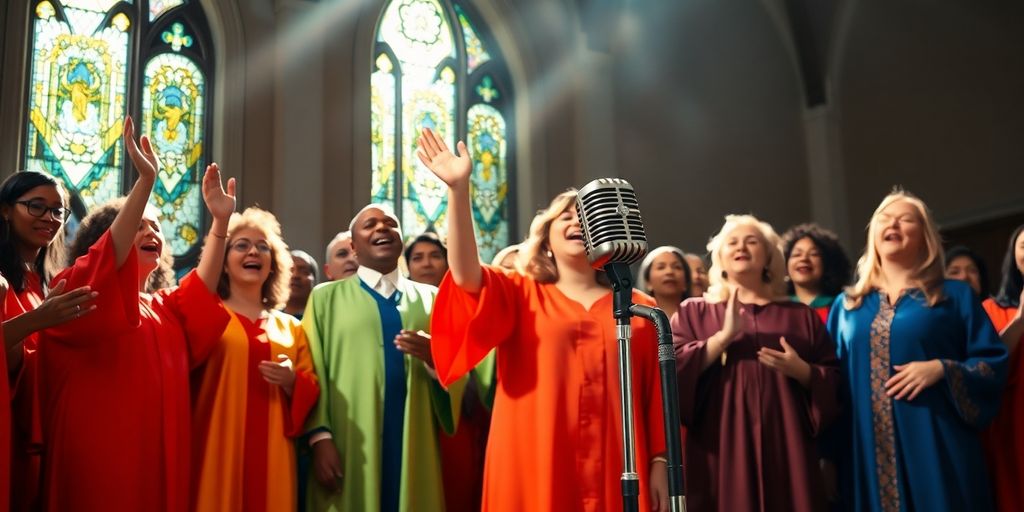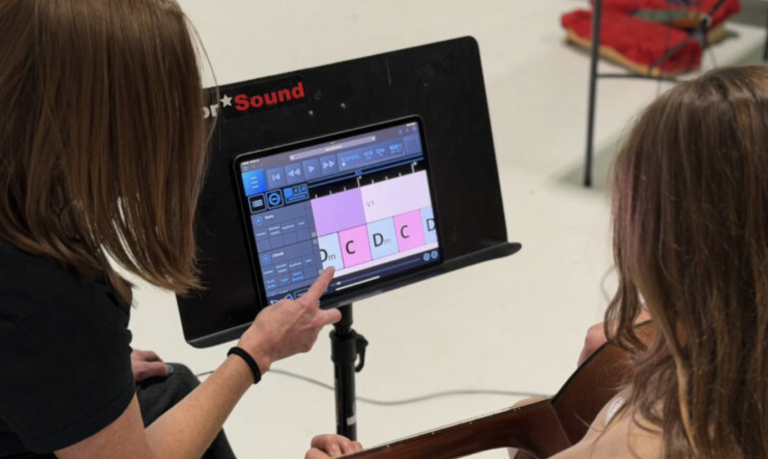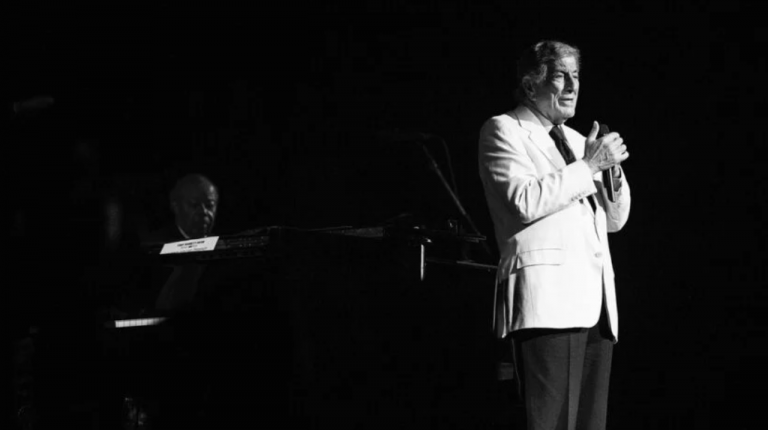
Gospel music, with its deep roots in American history, has always been more than just songs; it’s a powerful force. From its beginnings in African American churches to its current global reach, gospel music has shaped culture, inspired movements, and touched countless lives. This article explores how gospel music came to be, its financial impact, its role in communities, its influence on popular culture, and how it’s changing for the future.
Key Takeaways
- Gospel music started in African American churches, mixing old spirituals and hymns, and quickly became a big part of American culture.
- The gospel music industry makes a lot of money through album sales, concerts, and merchandise, with major labels and artists driving its success.
- Gospel music has been a source of strength for the African American community, playing a big part in the Civil Rights Movement and shaping spirituality.
- Gospel music has crossed over into mainstream culture, influencing many popular music styles and artists, and showing up in movies and TV.
- Gospel music is growing globally, using new technology to reach more people and continuing to evolve while keeping its core message.
The Genesis of Gospel Music in America
Gospel music’s story in America is pretty amazing. It’s more than just music; it’s a cultural force that shaped so much of what we listen to today. It’s a journey through history, faith, and the African American experience.
Early Influences and Origins
Gospel music didn’t just pop up out of nowhere. It’s got roots that go way back, drawing from a bunch of different places. Think about the old spirituals sung by enslaved Africans, the hymns brought over by European settlers, and the raw emotion of the blues. All these things mixed together to create something new. It was a melting pot of sounds and experiences.
- African rhythms and musical traditions
- European hymns and harmonies
- The call-and-response style of worship
The Role of African American Churches
The African American church was the incubator for gospel music. It was a safe space where people could express their faith, their pain, and their hope through song. The music wasn’t just entertainment; it was a form of worship, a way to connect with God, and a source of strength in the face of adversity. The church provided the community and the platform for gospel to grow. Black American gospel music really took off here.
Characteristics of Early Gospel Sound
Early gospel music had a sound all its own. It was raw, emotional, and full of energy. Think powerful vocals, heartfelt lyrics, and rhythms that made you want to move. It wasn’t polished or perfect, but it was real. It was music that came from the soul. It was simple, but it was powerful. It was the sound of a community finding its voice.
The early gospel sound was characterized by its use of improvisation, call-and-response, and a strong emphasis on rhythm. It was music that was meant to be felt as much as it was meant to be heard. It was a way for people to express their faith and find joy in the midst of hardship.
The Economic Impact of Gospel Music

Gospel music isn’t just about faith and inspiration; it’s also a significant economic force. From record sales to live performances, the gospel music industry generates substantial revenue and influences various sectors of the economy. It’s interesting to see how something so deeply rooted in spirituality can also have such a tangible financial impact.
Revenue Generation in the Gospel Music Industry
The gospel music industry generates revenue through various channels. Album sales, both physical and digital, contribute a significant portion. Concert tickets and merchandise sales also add to the revenue stream. Licensing deals, where gospel songs are used in films, television shows, and commercials, provide another avenue for income. In 2019, gospel music sales reached $139 million, showing the genre’s financial strength. It’s a business, just like any other music genre, with its own unique dynamics and opportunities.
Major Record Labels and Artists
Several major record labels play a crucial role in the gospel music industry. Labels like Motown Gospel, RCA Inspiration, and Verity Records have signed some of the biggest names in gospel music. These artists, including Kirk Franklin, Yolanda Adams, and Fred Hammond, have achieved commercial success and won numerous awards. These labels invest in artists, produce albums, and promote their music, driving the industry forward. The success of these gospel music artists helps to solidify the genre’s influence and impact.
Gospel Music’s Influence on the Broader Music Industry
Gospel music’s influence extends beyond its own genre. It has influenced other genres, such as soul, R&B, and hip-hop. Many artists have sampled gospel songs, incorporating them into their own music. Gospel music has also provided a platform for aspiring musicians and singers to showcase their talents and gain recognition. It’s a foundational genre that has shaped the sound of American popular music. The emotional delivery and uplifting messages of gospel music resonate with a wide audience, making it a powerful force in the music industry.
Gospel music festivals also have a positive impact on local economies. They bring in tourism dollars, as attendees often travel from out of town to attend these events. Local businesses, such as hotels, restaurants, and shops, benefit from the increased foot traffic generated by these festivals. Additionally, gospel music festivals often partner with local organizations and charities, further contributing to the local community.
Gospel Music’s Role in the African American Community
Gospel music isn’t just music in the African American community; it’s a lifeline, a source of strength, and a powerful form of expression. It’s woven into the very fabric of the community, providing solace, hope, and a connection to faith. It’s more than entertainment; it’s a cultural cornerstone.
A Source of Strength and Empowerment
Gospel music has always been a place to turn to. It’s a way to find strength in tough times, offering a message of hope and resilience. It’s a reminder that even in the face of adversity, there’s always something to hold onto. It’s a way to express joy, sorrow, and everything in between, all within a spiritual context. It’s a communal experience, bringing people together through shared faith and emotion. The music’s emotional delivery and uplifting messages are what make it so special.
Gospel Music and the Civil Rights Movement
Gospel music played a huge role during the Civil Rights Movement. Songs like "We Shall Overcome" became anthems, providing a soundtrack for protests and marches. It gave activists strength and courage to keep fighting for equality. It was a unifying force, bringing people together and reminding them that they weren’t alone in their struggle. The music helped to galvanize the movement and bring about real social change. It was more than just music; it was a weapon of hope and resistance. You can learn more about the impact of Black Music on the movement.
Impact on African American Spirituality
Gospel music is deeply intertwined with African American spirituality. It’s a way to connect with faith, express devotion, and find comfort in times of hardship. It’s often performed in churches, serving as a form of worship and praise. It’s a way to express emotions that are hard to put into words, and it provides a sense of peace and connection to something bigger than oneself. It’s a vital part of the spiritual lives of many African Americans.
Gospel music has provided a means for African Americans to connect with their faith, find solace in times of hardship, and express their devotion. It’s a powerful form of worship and a source of spiritual nourishment.
The Influence of Gospel Music on Popular Culture
Gospel music’s influence isn’t just confined to churches or the African American community; it’s made a real splash in mainstream culture. It’s like that one friend who knows everyone and gets invited to every party – gospel’s reach is wide.
Crossover Appeal and Genre Influence
Gospel music has this amazing ability to blend with other styles. You can hear its echoes in soul, R&B, rock and roll, and even pop music. Think about it: Aretha Franklin, Sam Cooke, and Whitney Houston all got their start singing gospel before they became huge mainstream stars. It’s like gospel was their training ground, giving them the vocal power and emotional depth that made them legends. It’s not just about the notes they hit, but the feeling they brought to their music. Gospel’s influence on American culture is undeniable.
Gospel’s Impact on Popular Icons
Lots of famous people – musicians, actors, athletes – say gospel music has been a big influence on them. Elvis Presley, for example, loved gospel and often included elements of it in his performances. Oprah Winfrey has talked about how gospel music has shaped her life and career. It’s like gospel provides a foundation of faith and resilience that helps people succeed, no matter what they do. It’s a source of strength and inspiration.
Gospel Music in Film and Television
Gospel-inspired music shows up in movies, TV shows, and commercials all the time. Remember "Sister Act" or "The Preacher’s Wife"? Those movies brought gospel music to a much wider audience. It’s a way of adding depth and emotion to a scene, or of conveying a message of hope and redemption. It’s not just background music; it’s a way of telling a story. The use of gospel-inspired music in media is a testament to its enduring appeal.
Gospel music’s journey from its origins in the African American church to its presence in mainstream media is a story of cultural exchange and influence. It’s a reminder that music can transcend boundaries and connect people from all walks of life.
The Rise of Gospel Music Festivals and Concerts
Gospel music events have really taken off in recent years. You see more and more festivals and concerts popping up, drawing huge crowds from all over, even internationally. These events are a big deal for artists, giving them a stage to shine and connect with their fans. It’s cool to see how these gatherings have grown and become such an important part of the gospel music scene.
Growth and Popularity of Gospel Events
It’s amazing how much gospel music events have grown. What started as smaller, local gatherings have turned into massive festivals that attract thousands. This growth shows how much people love and appreciate gospel music. You can find events happening all year round, from small church concerts to huge outdoor festivals. The variety is pretty impressive, and there’s something for everyone who enjoys the genre. The origins of gospel music have evolved into this vibrant scene.
Platform for Artists and Fan Engagement
Gospel music festivals are a great platform for artists, both well-known and up-and-coming. These events give them a chance to perform in front of big audiences, which can really boost their careers. Plus, it’s a fantastic way for fans to connect with their favorite artists. You often see meet-and-greets, workshops, and other activities that let fans get closer to the music and the people who make it. It’s all about creating a community and celebrating the music together.
Economic Benefits for Local Communities
Gospel music festivals aren’t just good for the music scene; they also bring a lot of money into the local communities where they’re held. Think about it: people travel from out of town, stay in hotels, eat at restaurants, and shop at local stores. All that spending adds up and gives the local economy a nice boost. Plus, many festivals partner with local charities and organizations, which helps support the community even more. Here’s a quick look at the potential economic impact:
| Sector | Benefit |
|---|---|
| Hotels | Increased occupancy rates |
| Restaurants | Higher sales volumes |
| Local Shops | More foot traffic and purchases |
| Charities | Increased donations and awareness |
Gospel music festivals are a win-win. They provide entertainment and spiritual enrichment for attendees while also providing economic benefits for the local community.
Here are some ways these festivals help:
- Create temporary jobs for locals.
- Increase tax revenue for the city or town.
- Showcase the area to visitors, potentially encouraging future tourism.
Innovations and the Future of Gospel Music

Gospel music isn’t stuck in the past; it’s constantly changing and finding new ways to connect with people. From blending with other genres to using the latest tech, gospel is evolving. It’s pretty cool to see how it stays true to its roots while embracing what’s new.
Adapting to the Digital Age
These days, it’s all about getting your music out there online. Gospel artists are using platforms like TikTok for evangelization to reach new audiences. It’s not just about recording albums anymore; it’s about creating content that people can share and connect with on social media. This shift has opened up a lot of doors for independent artists who might not have had a chance in the old music industry system.
Technological Advancements in Production
Technology is changing how gospel music is made. Think virtual choirs, where singers record their parts separately and then combine them into one song. Or artists collaborating across different genres, mixing gospel with hip-hop or EDM. These innovations allow for more creativity and push the boundaries of what gospel music can be. It’s all about experimenting and finding new sounds.
Global Reach and Accessibility
Gospel music is no longer limited to the United States. Streaming services have made it easier for people all over the world to discover gospel music. Artists are touring internationally, and collaborations with musicians from different countries are becoming more common. This global reach is helping to spread the message of gospel music to new audiences and cultures.
Gospel music’s future looks bright. It will continue to evolve and adapt, inspiring and resonating with audiences worldwide. The enduring legacy of gospel music is a testament to its power and significance in society.
The Lasting Power of Gospel Music
So, what’s the big takeaway here? Gospel music isn’t just some old-school genre; it’s a living, breathing thing that keeps changing and touching people. It’s been around for ages, helping folks through tough times and celebrating good ones. Think about it: this music has shaped so many other styles, from soul to rock, and it’s given us some truly amazing artists. It’s also played a huge part in communities, especially in the African American community, offering comfort and a voice when it was really needed. Even now, with all the new tech, gospel music is finding fresh ways to reach people all over the world. It just goes to show, some things are just built to last, and gospel music is definitely one of them. It’s got this special something that keeps it going strong, inspiring new generations, and that’s pretty cool.
Frequently Asked Questions
Where did gospel music come from?
Gospel music started in African American churches in the late 1800s and early 1900s. It was a way for people to show their faith and find comfort during tough times.
How has gospel music affected other music styles?
Gospel music has greatly influenced many other types of music, like soul, R&B, and rock and roll. Many famous singers, such as Aretha Franklin and Sam Cooke, started by singing gospel.
What role does gospel music play in the African American community?
Gospel music has played a big part in the African American community by giving people strength, hope, and a way to express themselves. It was also very important during the Civil Rights Movement, with songs that gave courage to activists.
How does gospel music make money?
Gospel music makes money through album sales, concert tickets, merchandise, and deals for using songs in other places. Big record labels like Motown Gospel and RCA Inspiration are key players in the industry.
Is gospel music popular outside of churches?
Yes, gospel music has made its way into popular culture. You can hear gospel-inspired songs in movies, TV shows, and commercials. Famous people like Elvis Presley and Oprah Winfrey have also talked about how gospel music has inspired them.
How is gospel music changing for the future?
Gospel music is changing to fit the digital world, using new technologies for making music and reaching more people online. It’s becoming more global, with artists from different places working together.








